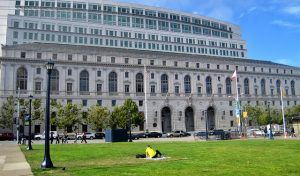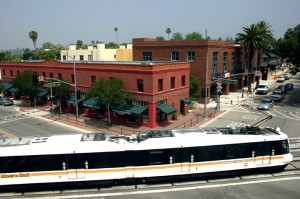Do you understand what Prop 15’s proposed ‘split roll’ property tax measure is? On tonight’s City Visions at 6pm, we will hear arguments for and against Prop 15 on California’s ballot this November. Is it an appropriate amendment to Prop 13, as supporters claim, or a deliberate weakening of an important protection for commercial property owners?
Joining me will be:
- Susan Shelley – Columnist and member of the editorial board for the Southern California News Group and Vice President of Communications for the Howard Jarvis Taxpayers Association.
- Ben Grieff – Campaign Director and Spokesperson for Evolve California, which organizes grass-roots campaigns in support of middle-class and center-left Californians.
We will also hear an update on San Francisco’s latest reopening guidelines from Erin Allday, health reporter for the San Francisco Chronicle.
Call us during the show at 6pm with your questions at 866-798-TALK or send an email to cityvisions@kalw.org. We’re airing on 91.7 FM KALW in San Francisco and streaming live. Hope you can join us!

Back in 2017, many breathless legal observers (including me) thought that the California Supreme Court had just opened up a major loophole in Prop 13/Prop 218 restrictions on raising local taxes. The two voter-enacted amendments to the state constitution otherwise require that any new taxes receive a two-thirds vote to go into effect.
But the Court ruled that year in California Cannabis Coalition vs. City of Upland that the supermajority hurdle did not apply to taxes put on the ballot through citizen petitions. Some legal experts and advocates pushed back on how much of a loophole the decision opened, suggesting that the case was overblown.
Now today we have confirmation that in fact the Supreme Court did dramatically scale back the two-thirds hurdle that has stymied local revenue measures.
The case at issue arose in San Francisco, where Proposition C passed by a majority, but not two-thirds, to fund homeless services through a new corporate tax. The measure was placed on the ballot by a citizen petition, so the city attorney had determined that only a simple majority was needed, based on the 2017 decision.
The Howard Jarvis Taxpayers Association sued, lost and appealed, but yesterday the California Supreme Court declined to review. So barring any new cases or contrary appellate court rulings on this same issue, the case is closed, so to speak. That is, unless the voters approve a new restriction to close this loophole, as Prop 218 was originally placed on the ballot to close previous loopholes in Prop 13 based on an earlier California Supreme Court decision.
The ramifications? Any local government that wants to raise revenue for purposes like new transit or wildfire prevention could theoretically ask a nonprofit or business group to conduct signature gathering to place the measure on the ballot. Then they would only need a simple majority approval at the ballot box. In short, as I wrote back in 2017, this decision could be transformational for local “self-help” efforts to fund badly needed infrastructure projects and services.
Back in August, the California Supreme Court potentially “ripped a huge hole” in Prop 13 and 218, the two constitutional initiatives in the state that force a two-thirds majority requirement on any local tax measures. In California Cannabis Coalition vs. City of Upland, the court held that “general taxes” initiated by citizens can now be approved with a simple majority vote.
While the court apparently attempted to limit the decision just to “general taxes,” the reasoning implies that all citizen-initiated taxes only require 50% + 1 for approval, including special taxes like for transit or housing (i.e. for a specific purpose and not for general revenue for the government). CalMatters has a nice summary of the legal and political situation that ensues from this decision.
And now here comes San Francisco to test that broad interpretation. As the San Francisco Chronicle reports, backers of a city ballot measure to divert more than half of San Francisco’s hotel-tax revenue for arts programs and homeless family services lost last year with a majority in favor — but not two-thirds.
But based on a new legal opinion by City Attorney Dennis Herrera, they can now try again and get approval with a simple majority vote. Herrera’s office informed the Elections Department that “the Court’s analysis and reasoning [in California Cannabis] also appear to apply to the two-thirds voting requirements for special taxes” like the one that lost last year.
But Herrera concedes that “future litigation, legislation, or a ballot measure to amend the State Constitution to address the California Cannabis decision may resolve this issue with more certainty.”
And if this measure is eventually approved by the voters with less than a two-thirds majority, Herrera may have just guaranteed that it becomes his predicted test case to resolve the issue.
 California local governments have long been stymied in efforts to raise taxes for basic infrastructure and services by California’s constitution. Two voter-approved constitutional amendments, Propositions 13 and 218, require that any new local “special tax” (i.e. for a specific purpose and not for general revenue for the government) receive two-thirds voter approval.
California local governments have long been stymied in efforts to raise taxes for basic infrastructure and services by California’s constitution. Two voter-approved constitutional amendments, Propositions 13 and 218, require that any new local “special tax” (i.e. for a specific purpose and not for general revenue for the government) receive two-thirds voter approval.
It’s a high bar that has made it more difficult for locals to fund transit, parks, and other specific needs. And when local governments do secure two-thirds support, the initiatives are often the result of promises to spread the revenue around to make as many voters happy as possible, rather than prioritizing efforts to spend the money as cost-effectively as possible (the two are not always synonymous).
So it’s potentially a big deal that the California Supreme Court ruled today that any city or county “general tax” measure (i.e. not one for a specific purpose like transit or parks) that is placed on the ballot via the initiative process (a petition signed by 15 percent of the city’s voters) is not bound by Prop 218 requirements. Because the same logic could easily apply to “special taxes” that otherwise require a two-thirds supermajority, it potentially opens the door for much easier approval of any new tax measure placed by special interests.
The facts of California Cannabis Coalition vs. City of Upland involve a nonprofit that secured enough signatures to get a medical marijuana initiative on the ballot in the City of Upland. The initiative included proposed fees on new dispensaries, but the city council concluded the fees would constitute a general tax that needed to be placed on the ballot at the next general election.
The case ironically ended up being moot for these parties, as the Upland ballot measure was defeated handily by city voters. But the Supreme Court wanted to rule on the question as to whether or not Prop 13 and Prop 218 meant to restrict all local tax measures placed on the ballot, regardless of they got there — or just the ones placed on the ballot by “local governments” (i.e. the city, county or local agency).
Ultimately, the court concluded that the voter initiative power can only be limited when measures like Prop 13 or Prop 218 specifically state that they’re limiting these powers. Otherwise, they only apply to government entities like a city council or transportation agency.
The result may now be that any citizen, nonprofit or business group that wants to place a sales tax measure or fee on the ballot for something like a new school or transit line may only need a simple majority voter approval, provided they can get enough signatures for their measure. And unless barred by some other law, I gather there’s nothing stopping agency representatives or elected leaders in their individual capacities from sponsoring these campaigns in ways that essentially amount to the city, county, or agency sponsoring the measure themselves.
As an example, take a transit sales tax measure in a place like Los Angeles County. In the past, the county’s transportation agency, LA Metro, has sponsored these initiatives under their state law grant of authority, and the county supervisors have approved placing them on the ballot. Due to Prop 218, they’ve required two-thirds approval.
But now suppose an elected leader who serves on Metro, or a nonprofit or business group closely aligned with Metro, wants to place such a tax measure on the ballot. Provided they can fundraise for the signature gathering (which would be expensive in a county as large as Los Angeles), they would now only need a simple majority approval at the ballot box. In short, this decision could be transformational for local “self-help” efforts to fund badly needed infrastructure projects.
Or as Jon Coupal, head of the pro-Prop 13 Howard Jarvis Taxpayers Association tweeted after the decision, described it:
CA Supreme Court rips huge whole in Prop 13 and Prop 218. Tax hikes by special interest groups may avoid 2/3 vote protection.
— Jon Coupal (@joncoupal) August 28, 2017
At a time when California is struggling to reduce emissions from the transportation sector due to growing commutes from the lack of housing and transit near jobs, this decision could be significant for finally allowing locals the flexibility they need to fund these investments. Under California Cannabis Coalition vs. City of Upland, local government finance for a host of environmentally significant projects, from parks to transit to infill housing infrastructure, may have just gotten easier to pass.
 L.A. Metro has been hard at work cooking up a new list of big transit projects for the region, which would be funded with a new half-cent sales tax this November. The plan will be announced this Friday, but in the meantime, initial details leaked on some of the proposed projects last week, leading to this Los Angeles Times article from Laura Nelson:
L.A. Metro has been hard at work cooking up a new list of big transit projects for the region, which would be funded with a new half-cent sales tax this November. The plan will be announced this Friday, but in the meantime, initial details leaked on some of the proposed projects last week, leading to this Los Angeles Times article from Laura Nelson:
As envisioned, the plan would funnel about one-third of the $120 billion into full or partial funding for five new transit lines and at least six extensions of lines that are already built or under construction, the officials said.
The project list appears carefully constructed to gain voter support in all areas of the vast county, with rail lines, highway upgrades and other proposed improvements reaching communities as far-flung as Sylmar, Torrance, Artesia and Claremont.
That political dynamic — to spread the projects around the county to secure the needed two-thirds support — is the direct result of California’s Prop 13. It passed in 1978 and was eventually construed to require super-majorities for even local tax measures. As a result, self-help measures like a local transit tax must prioritize political benefits (i.e. geographic equity) over economic effectiveness or other needs.
I discussed this dynamic briefly in this short KPCC radio piece on Friday.
State leaders could really help regions like Los Angeles and other counties around the state if they allowed voters to reform Prop 13. Reducing the voter-approval threshold from two-thirds to 55% would not only ensure that locals could more easily raise funds for badly needed infrastructure, it could make those measures more effective by not having to please everyone and their mother.


